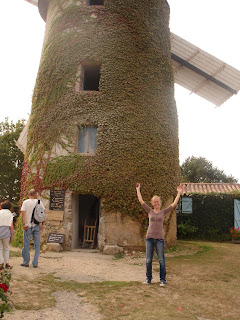Before coming to France, I read a
previous CIEE blogger's post on la bise and why it is complicated. It
certainly made me nervous, but once I got here I thought, hey, this
isn't so hard after all! What was she complaining about?
Well, la bise is pretty simple. You
kiss someone on each cheek to greet them, starting to the left and
ending on the right. I feared having nose-bumping issues or something
equally awkward, but it's not difficult.
What is difficult
is that the rules aren't always the same. Sometimes you don't
go from left to right: if you arrive from the right and start working
your way down a line of friends, you'll probably kiss from right to
left, no big deal.
I just
so happen to live in the Vendée, a département where they kiss four
times instead of two. But among teenagers, close friends, and family,
it's only twice. There must be even more subtle rules than that,
because the other day I went to a dinner party and greeted the
hostess with four cheek kisses (watching her carefully to determine
if she was going for four or two) and then moved confidently on the
the host, where I went for four kisses and he went for two.
(AWKWARD.) Is it a guy/girl difference? Or first greeting vs. second
greeting? I don't yet know.
I've
been told I need more pictures to separate my massive walls of text,
so here's an unrelated picture of our cat, Nuts!
The
worst part is not knowing whether to do la bise or not. When I see my
friends at school, usually we do la bise first thing in the morning,
but not if we see each other again at lunch, for example. But what
counts as a friend? Do I do la bise with someone who's hanging out
with my friend, even if they aren't my
friend? Sometimes yes, sometimes no. I haven't figured out the rules
yet, so usually I just follow their lead. But sometimes I worry I'm
being rude. (Oh well, I'm American, they're going to have to accept
my faults.) When my host siblings take me to parties, do I have to go
around the table and kiss everyone, even if I don't know any of them?
(Answer: usually yes.
I think.) Sometimes people do handshakes instead, but I'm not sure
where the line is between slightly businesslike handshake situations
and friend or family bise situations. Eek.
At the
same time, I find it rather charming. In the US, people either greet
each other with hugs (friends and family), with handshakes (business
or first introductions among adults), or with no touch at all
(anything that doesn't fall into the first two categories). So if I
show up at school and join a group of friends and acquaintances
hanging out together, the most likely thing to happen is just to join
the circle, say “hello,” and give everyone a sort of greeting
nod. Feels kind of abrupt, sometimes. But in France, the guys will
all shake hands with each other every time they meet, and girl/girl
or guy/girl interaction involves cheek kisses. You never say hello to
anyone without a physical acknowledgement of their presence, and
while it makes me uncomfortable, I appreciate the idea.
More
unrelated pictures! Here's me standing next to a really old windmill,
doing my awkward “I never know what to do with my hands so I guess
I'll throw them up in the air” pose.
In
other unrelated news, my English teacher is terrible. As his native
language is not English and I know how difficult learning languages
is, I respect his accomplishments. He has a French accent, but it's
not terrible. He can say the English “th” sound (think how the
stereotypical Frenchman says “zee baguette” instead of “the
baguette”) and usually manages English “r”s, though not always.
His ear for English sentence structure is pretty good, but sometimes
he comes up with phrases that are just odd – I can't even put my
finger on if it's wrong or not, but it's definitely odd. So he's not
perfect. In my experience, native speakers of languages make much
better teachers than people of the same culture as their students who
learned the language in school. But there are far better reasons he
shouldn't be a teacher: 1) he's really really boring 2) he commands
absolutely no respect from his students, because he's just clueless
and awkward and says silly things, and 3) his grades have no relation
to reality.
He
gave me a 8/20 on my English homework. What. The. Freak. I already
talked about how expectations in school are lower here, where 12-16
out of 20 is a good range for your grades. At home, you pretty much
want As which are above 90% and would therefore be 18/20 or higher.
Anyway, even though the standards are lower, 8/20 is bad. And, um,
just saying, but I actually speak English. I think. I mean, pretty
much by definition if I disagree with my English teacher, I'm right,
because he's French. What sounds natural to my ear is
how properly spoken English should sound. Spelling and grammar are
more concrete than that, but I happen to be remarkably good at both,
so my previous statement still stands. I have no idea why he gave me
such a low grade except that everyone says his grades have nothing to
do with reality. I know someone who cheated on a quiz so she knew she
had all the right answers, and he gave her 2/20. Whaaat. Anyway, I'll
be doing my best to sort out that situation, because it would
embarrassing and not good for my diploma if I failed English. Not
just English for anglophones (which I've always gotten As in) but
English for French people. Le monde est fou.
Your complimentary
French song for the day is called Les Passants, by Zaz, and is pretty
popular here: http://www.youtube.com/watch?v=xEu3oxxclW4


No comments:
Post a Comment